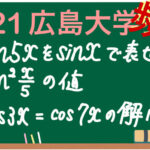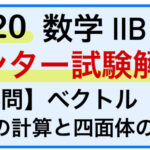【2019京都大学・理系】
\(0<\theta<\displaystyle\frac{\pi}{2}\) とする.\(\cos \theta\) は有理数でないが,\(\cos 2\theta\) と \(\cos 3\theta\) がともに有理数となるような \(\theta\) の値を求めよ.
ただし,\(p\) が素数のとき,\(\sqrt{p}\) が有理数でないことは証明なしに用いてよい.
解答・解説
\(p\) , \(q\) を有理数として
\(\cos 2\theta=2\cos^2 \theta-1=p\) ・・・①
\(\cos 3\theta=4\cos^3 \theta-3\cos \theta=q\) ・・・②
とおく.
①より,\(\cos^2 \theta=\displaystyle\frac{p+1}{2}\) を②に代入すると
\(4\cdot\displaystyle\frac{p+1}{2}\cdot\cos \theta-3\cos \theta=q\)
\((2p-1)\cos \theta=q\)
\(2p-1\not=0\) と仮定すると
\(\cos \theta=\displaystyle\frac{q}{2p-1}\) となり
\(\cos \theta\) が有理数でないことに反する.
よって,\(2p-1=0\) \(\iff\) \(p=\displaystyle\frac{1}{2}\)
\(\cos 2\theta=\displaystyle\frac{1}{2}\)
\(0<\theta<\displaystyle\frac{\pi}{2}\) より\(0<2\theta<\pi\) なので
\(2\theta=\displaystyle\frac{\pi}{3}\) \(\iff\) \(\theta =\displaystyle\frac{\pi}{6}\)
このとき,\(\cos \theta=\displaystyle\frac{\sqrt{3}}{2}\) , \(\cos 2\theta=\displaystyle\frac{1}{2}\) , \(\cos 3\theta=0\) となり \(\sqrt{3}\) は無理数であるから題意を満たす.
したがって,\(\theta=\displaystyle\frac{\pi}{6}\)







コメント